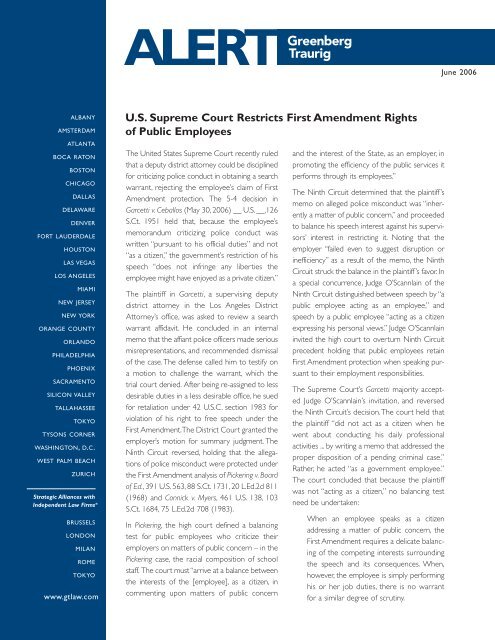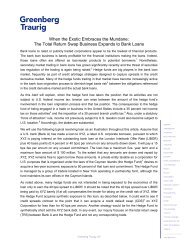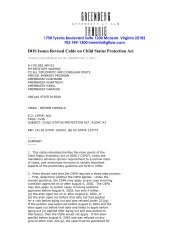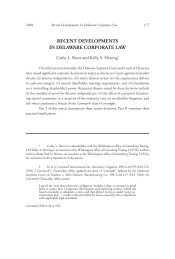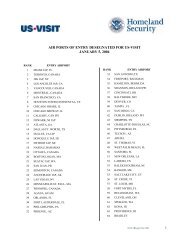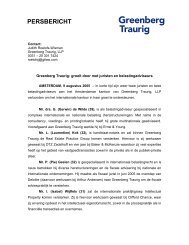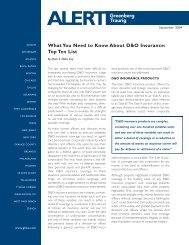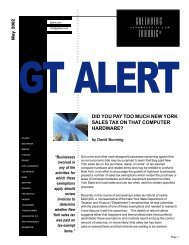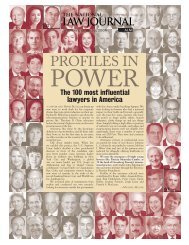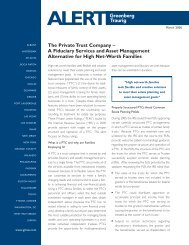U.S. Supreme Court Restricts First Amendment Rights of Public ...
U.S. Supreme Court Restricts First Amendment Rights of Public ...
U.S. Supreme Court Restricts First Amendment Rights of Public ...
You also want an ePaper? Increase the reach of your titles
YUMPU automatically turns print PDFs into web optimized ePapers that Google loves.
ALBANY<br />
AMSTERDAM<br />
ATLANTA<br />
BOCA RATON<br />
BOSTON<br />
CHICAGO<br />
DALLAS<br />
DELAWARE<br />
DENVER<br />
FORT LAUDERDALE<br />
HOUSTON<br />
LAS VEGAS<br />
LOS ANGELES<br />
MIAMI<br />
NEW JERSEY<br />
NEW YORK<br />
ORANGE COUNTY<br />
ORLANDO<br />
PHILADELPHIA<br />
PHOENIX<br />
SACRAMENTO<br />
SILICON VALLEY<br />
TALLAHASSEE<br />
TOKYO<br />
TYSONS CORNER<br />
WASHINGTON, D.C.<br />
WEST PALM BEACH<br />
ZURICH<br />
Strategic Alliances with<br />
Independent Law Firms*<br />
BRUSSELS<br />
LONDON<br />
MILAN<br />
ROME<br />
TOKYO<br />
www.gtlaw.com<br />
U.S. <strong>Supreme</strong> <strong>Court</strong> <strong>Restricts</strong> <strong>First</strong> <strong>Amendment</strong> <strong>Rights</strong><br />
<strong>of</strong> <strong>Public</strong> Employees<br />
The United States <strong>Supreme</strong> <strong>Court</strong> recently ruled<br />
that a deputy district attorney could be disciplined<br />
for criticizing police conduct in obtaining a search<br />
warrant, rejecting the employee’s claim <strong>of</strong> <strong>First</strong><br />
<strong>Amendment</strong> protection. The 5-4 decision in<br />
Garcetti v. Ceballos (May 30, 2006) __ U.S. __,126<br />
S.Ct. 1951 held that, because the employee’s<br />
memorandum criticizing police conduct was<br />
written “pursuant to his <strong>of</strong>ficial duties” and not<br />
“as a citizen,” the government’s restriction <strong>of</strong> his<br />
speech “does not infringe any liberties the<br />
employee might have enjoyed as a private citizen.”<br />
The plaintiff in Garcetti, a supervising deputy<br />
district attorney in the Los Angeles District<br />
Attorney’s <strong>of</strong>fice, was asked to review a search<br />
warrant affidavit. He concluded in an internal<br />
memo that the affiant police <strong>of</strong>ficers made serious<br />
misrepresentations, and recommended dismissal<br />
<strong>of</strong> the case.The defense called him to testify on<br />
a motion to challenge the warrant, which the<br />
trial court denied. After being re-assigned to less<br />
desirable duties in a less desirable <strong>of</strong>fice, he sued<br />
for retaliation under 42 U.S.C. section 1983 for<br />
violation <strong>of</strong> his right to free speech under the<br />
<strong>First</strong> <strong>Amendment</strong>.The District <strong>Court</strong> granted the<br />
employer’s motion for summary judgment. The<br />
Ninth Circuit reversed, holding that the allegations<br />
<strong>of</strong> police misconduct were protected under<br />
the <strong>First</strong> <strong>Amendment</strong> analysis <strong>of</strong> Pickering v. Board<br />
<strong>of</strong> Ed., 391 U.S. 563, 88 S.Ct. 1731, 20 L.Ed.2d 811<br />
(1968) and Connick v. Myers, 461 U.S. 138, 103<br />
S.Ct. 1684, 75 L.Ed.2d 708 (1983).<br />
In Pickering, the high court defined a balancing<br />
test for public employees who criticize their<br />
employers on matters <strong>of</strong> public concern – in the<br />
Pickering case, the racial composition <strong>of</strong> school<br />
staff. The court must “arrive at a balance between<br />
the interests <strong>of</strong> the [employee], as a citizen, in<br />
commenting upon matters <strong>of</strong> public concern<br />
and the interest <strong>of</strong> the State, as an employer, in<br />
promoting the efficiency <strong>of</strong> the public services it<br />
performs through its employees.”<br />
The Ninth Circuit determined that the plaintiff’s<br />
memo on alleged police misconduct was “inherently<br />
a matter <strong>of</strong> public concern,” and proceeded<br />
to balance his speech interest against his supervisors’<br />
interest in restricting it. Noting that the<br />
employer “failed even to suggest disruption or<br />
inefficiency” as a result <strong>of</strong> the memo, the Ninth<br />
Circuit struck the balance in the plaintiff’s favor. In<br />
a special concurrence, Judge O’Scannlain <strong>of</strong> the<br />
Ninth Circuit distinguished between speech by “a<br />
public employee acting as an employee,” and<br />
speech by a public employee “acting as a citizen<br />
expressing his personal views.” Judge O’Scannlain<br />
invited the high court to overturn Ninth Circuit<br />
precedent holding that public employees retain<br />
<strong>First</strong> <strong>Amendment</strong> protection when speaking pursuant<br />
to their employment responsibilities.<br />
The <strong>Supreme</strong> <strong>Court</strong>’s Garcetti majority accepted<br />
Judge O’Scannlain’s invitation, and reversed<br />
the Ninth Circuit’s decision.The court held that<br />
the plaintiff “did not act as a citizen when he<br />
went about conducting his daily pr<strong>of</strong>essional<br />
activities ... by writing a memo that addressed the<br />
proper disposition <strong>of</strong> a pending criminal case.”<br />
Rather, he acted “as a government employee.”<br />
The court concluded that because the plaintiff<br />
was not “acting as a citizen,” no balancing test<br />
need be undertaken:<br />
When an employee speaks as a citizen<br />
addressing a matter <strong>of</strong> public concern, the<br />
<strong>First</strong> <strong>Amendment</strong> requires a delicate balancing<br />
<strong>of</strong> the competing interests surrounding<br />
the speech and its consequences. When,<br />
however, the employee is simply performing<br />
his or her job duties, there is no warrant<br />
for a similar degree <strong>of</strong> scrutiny.<br />
June 2006
The majority criticized the Ninth Circuit’s reasoning,<br />
stating that it “misconceives the theoretical<br />
underpinnings <strong>of</strong> our decisions.”The court explained<br />
that employees who “make public statements outside<br />
their <strong>of</strong>ficial duties” retain <strong>First</strong> <strong>Amendment</strong><br />
protections because they are engaged in the same<br />
kind <strong>of</strong> activity as citizens who do not work for the<br />
government. “When a public employee speaks<br />
pursuant to employment responsibilities, however,<br />
there is no relevant analogue to speech by citizens<br />
who are not government employees.”<br />
The majority also criticized the Ninth Circuit’s remark<br />
that it would be anomalous to require public<br />
employers to tolerate public criticism,while permitting<br />
them to restrict speech on the job. The majority<br />
noted that public employers “have the means at hand<br />
to avoid” this anomaly, by allowing internal criticism<br />
if they wish to encourage internal complaints.<br />
Justices Stevens, Souter, and Breyer wrote dissenting<br />
opinions. Justices Stevens and Ginsburg joined in<br />
the Souter dissent. All three dissenting opinions<br />
criticized the majority’s distinction between public<br />
employees “speaking as citizens” and “speaking in<br />
the course <strong>of</strong> employment.” The Souter dissent<br />
proposed an adjustment <strong>of</strong> the Pickering balancing<br />
test, which would permit public employers to restrict<br />
employee speech unless the employee “speaks on<br />
a matter <strong>of</strong> unusual importance” and “satisfies high<br />
standards <strong>of</strong> responsibility” in so doing. Justice<br />
Souter also warned that public employers could<br />
restrict employees’ <strong>First</strong> <strong>Amendment</strong> rights by<br />
drafting broad job descriptions that bring most<br />
communications within the employees’ <strong>of</strong>ficial<br />
duties. Finally, Justice Souter opined that application<br />
<strong>of</strong> the majority’s reasoning to a public university<br />
could infringe on academic freedom.<br />
The majority did not address Justice Souter’s proposed<br />
“adjustment” <strong>of</strong> the Pickering balancing test.<br />
It did “reject” his suggestion that excessively broad<br />
job descriptions could limit employee rights, noting<br />
that job descriptions do not necessarily track actual<br />
employee duties.The majority noted the academic<br />
freedom argument and declined to consider<br />
whether its analysis should be applied to scholarship<br />
or teaching cases.<br />
The majority referred to “sound principles <strong>of</strong> federalism<br />
and the separation <strong>of</strong> powers” in support<br />
<strong>of</strong> its decision, without explaining those principles<br />
further. The court apparently meant to express<br />
disapproval <strong>of</strong> judicial intervention in employment<br />
decisions made by the executive branches <strong>of</strong> state<br />
governments. The court concluded, “The <strong>First</strong><br />
<strong>Amendment</strong> does not prohibit managerial discipline<br />
based on an employee’s expressions made<br />
pursuant to <strong>of</strong>ficial responsibilities.”<br />
The Final Word<br />
The Garcetti majority assisted public employers in<br />
at least two respects. <strong>First</strong>, by establishing a<br />
“bright-line” rule, the majority affords public<br />
employers greater certainty when dealing with<br />
thorny free speech issues involving public employees.<br />
Second, by drawing this bright line at the far end<br />
<strong>of</strong> public employee conduct, the Garcetti decision<br />
provides employers with substantial authority to<br />
restrict public employees’ speech activities, for better<br />
or for worse.<br />
<strong>Public</strong> employers should carefully consider Garcetti<br />
and reevaluate policies and practices in this area.<br />
In light <strong>of</strong> the Garcetti bright line rule, public<br />
employers’ written policies should be revised,<br />
where needed, to fully inform public employees <strong>of</strong><br />
the proper boundaries <strong>of</strong> public discourse by public<br />
employees. Notwithstanding the debate between<br />
the Garcetti majority and minority camps on the<br />
breadth <strong>of</strong> job descriptions, public employers<br />
should consider reevaluating current job descriptions<br />
to ensure that certain speech activities are<br />
properly described as job functions.<br />
U.S. <strong>Supreme</strong> <strong>Court</strong> <strong>Restricts</strong> <strong>First</strong> <strong>Amendment</strong> <strong>Rights</strong> <strong>of</strong> <strong>Public</strong> Employees Page 2
2112v3<br />
PRACTICE AREAS<br />
ADA,Accessibility, Building and<br />
Life Safety Codes<br />
Antitrust and Trade Regulation<br />
Appellate<br />
Aviation and Aircraft Finance<br />
Business Immigration<br />
Business Reorganization and Bankruptcy<br />
Corporate and Securities<br />
Energy and Natural Resources<br />
Entertainment<br />
Environmental<br />
Executive Compensation and<br />
Employee Benefits<br />
Federal Marketing<br />
Financial Institutions<br />
Franchising<br />
Global Trade<br />
Government Contracts<br />
Governmental Affairs<br />
Health Business<br />
Hotel, Resort and Club<br />
Intellectual Property<br />
International<br />
Investment Funds<br />
Labor and Employment<br />
Land Development<br />
Life Sciences<br />
Litigation<br />
<strong>Public</strong> Finance<br />
<strong>Public</strong> Infrastructure<br />
<strong>Public</strong> Utility<br />
Real Estate<br />
Real Estate Investment Trusts<br />
Real Estate Operations<br />
Retail Industry Group<br />
Structured Finance and Derivatives<br />
Tax<br />
Technology, Media and Telecommunications<br />
Trusts and Estates<br />
This Alert was written by Lisa Halko in the Sacramento <strong>of</strong>fice and John Alan Doran<br />
in the Phoenix <strong>of</strong>fice. Please contact Ms. Halko at 916.442.1111 or Mr. Doran at<br />
602.445.8000, or your Greenberg Traurig liaison if you have any questions regarding<br />
the subject matter <strong>of</strong> this GT Alert.<br />
Albany<br />
518.689.1400<br />
Amsterdam<br />
+ 31 20 301 7300<br />
Atlanta<br />
678.553.2100<br />
Stacey Pastel Dougan<br />
Ernest LaMont Greer<br />
David Long-Daniels<br />
Rodney Gregory Moore<br />
Boca Raton<br />
561.955.7600<br />
Boston<br />
617.310.6000<br />
Joseph W. Ambash<br />
Terence P. Mc<strong>Court</strong><br />
Chicago<br />
312.456.8400<br />
Ruth A. Bahe-Jachna<br />
Dallas<br />
972.419.1250<br />
Hugh E. Hackney<br />
Delaware<br />
302.661.7000<br />
Denver<br />
303.572.6500<br />
Naomi G. Beer<br />
Jeannette M. Brook<br />
Fort Lauderdale<br />
954.765.0500<br />
Caran Rothchild<br />
Michele L. Stocker<br />
Houston<br />
713.522.1887<br />
Las Vegas<br />
702.792.3773<br />
Los Angeles<br />
310.586.7700<br />
Michelle Lee Flores<br />
Diana P. Scott<br />
Samuel H. Stein<br />
Miami<br />
305.579.0500<br />
Joseph Z. Fleming<br />
Ronald M. Rosengarten<br />
New Jersey<br />
973.360.7900<br />
Neil A. Capobianco<br />
Brian S. Cousin<br />
J. Michael Riordan<br />
Judy Scolnick<br />
Eric B. Sigda<br />
Kevin B. Walker<br />
New York<br />
212.801.9200<br />
Neil A. Capobianco<br />
Patrick M. Collins<br />
Brian S. Cousin<br />
Jerrold F. Goldberg<br />
Jonathan E. Goldberg<br />
Deanna H. Niño<br />
Eric B. Sigda<br />
David B. Spanier<br />
Peter D. Stergios<br />
Orange County<br />
714.708.6500<br />
Orlando<br />
407.420.1000<br />
Philadelphia<br />
215.988.7800<br />
Robert M. Goldich<br />
Phoenix<br />
602.445.8000<br />
Mary E. Bruno<br />
John Alan Doran<br />
John F. Lomax, Jr.<br />
Lawrence Rosenfeld<br />
Jeffrey H. Wolf<br />
Sacramento<br />
916.442.1111<br />
Lisa L. Halko<br />
Carol Livingston<br />
Silicon Valley<br />
650.328.8500<br />
William J. Goines<br />
Tallahassee<br />
850.222.6891<br />
Tokyo<br />
+ 81 3 3264 0671<br />
Tysons Corner<br />
703.749.1300<br />
Craig A. Etter<br />
Dawn M. Lurie<br />
Laura Foote Reiff<br />
John Scalia<br />
Washington, D.C.<br />
202.331.3100<br />
Craig A. Etter<br />
Maria E. Hallas<br />
Laura Foote Reiff<br />
West Palm Beach<br />
561.650.7900<br />
Bridget A. Berry<br />
Mark F. Bideau<br />
Lorie M. Gleim<br />
Bradford D. Kaufman<br />
Susan Fleischner Kornspan<br />
Zurich<br />
+ 41 1 364 26 00<br />
This Greenberg Traurig ALERT is issued for informational purposes only and is not intended to be construed or used as general legal advice.The<br />
hiring <strong>of</strong> a lawyer is an important decision. Before you decide, ask for written information about the lawyer’s legal qualifications and experience.<br />
Greenberg Traurig is a trademark and trade name <strong>of</strong> Greenberg Traurig, LLP and Greenberg Traurig, P.A. ©2006 Greenberg Traurig, LLP. All rights<br />
reserved. *Greenberg Traurig has entered into Strategic Alliances with the following independent law firms: Olswang in London and Brussels, Studio<br />
Santa Maria in Milan and Rome, and the Hayabusa Kokusai Law Offices in Tokyo. Greenberg Traurig is not responsible for any legal or other<br />
services rendered by attorneys employed by the Strategic Alliance firms.


